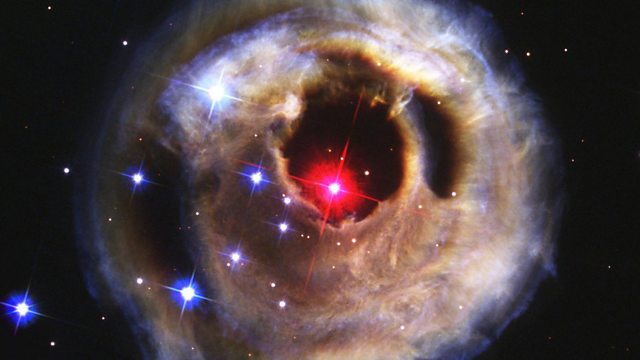
Red Nova explosion predicted
Astronomers predict a massive Red Nova explosion around 2022. Plus whale menopause; quahogs measure climate change; new peat finds in Congo; climate change in India; stuttering.
Astronomer Professor Larry Molnar and his students have made a rare prediction of when stars will explode. After an undergraduate student spotted a pulsating star, and observed the pulses getting quicker, the team claim to have calculated when the binary star system KIC 9832227 might collide creating a massive Red Nova explosion which will be visible to the naked eye in 2022, give or take a year.
Whale Menopause
Killer whales and humans are two of only three species that go through what we call menopause - stopping reproduction part-way through their lives. Victoria Gill joined the team observing a population of killer whales off the US Pacific coast which has helped British researchers to solve this evolutionary mystery.
Quahogs
Quahogs are a kind of clam and they can live for hundreds of years. Analysis of their shells provides a record of historical climate change. Researchers studying their shells have found big differences between the drivers of climate change now and in the pre-industrial era.
Peat in Congo
Peat is important. Made from decades of partially rotted plant material that builds up in wet conditions, this soil type is essential for locking carbon away from the atmosphere. The majority of peatland is found in cool latitudes, but scientists recently found a huge area of peat in northern Congo in Africa.
Climate Change In India
The result of US election in November was announced during the 2016 Marrakech UN Climate Change Conference, a meeting where most delegates were working to deliver on the promises of the previous Paris accord. Instead, a new US direction seemed to have emerged, with some in the new US cabinet going so far as to suggest the US should withdraw altogether from Paris, scrap the US's own Clean Power act, and re-open coal mines. Roger Harrabin explores whether other countries such as India might follow the Trump suit and relax their low-carbon initiatives.
Stuttering
Stuttering affects around 70 million people worldwide but it is a condition which is not fully understood. A new study led by Dr Jay Desai from Los Angeles Children's Hospital has found people who stutter have reduced blood flow in areas of the brain associated with language. He hopes these findings could lead to improved treatments.
The Science Hour was presented by Roland Pease with comments from Victoria Gill 大象传媒 Science Reporter.
Editor: Deborah Cohen
Picture: Star V838 Monocerotis - A possible "red nova" explosion captured in 2002. Credit: NASA, ESA and H.E. Bond (STScI)
Last on
More episodes
Previous
Broadcasts
- Sat 14 Jan 2017 23:06GMT大象传媒 World Service except News Internet
- Mon 16 Jan 2017 06:06GMT大象传媒 World Service South Asia
Podcast
-
![]()
Unexpected Elements
The news you know, the science you don't

